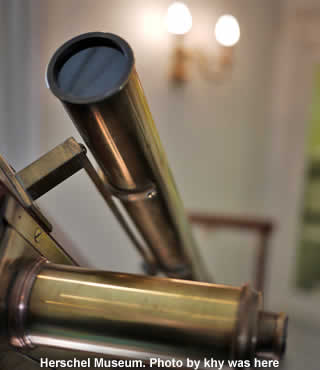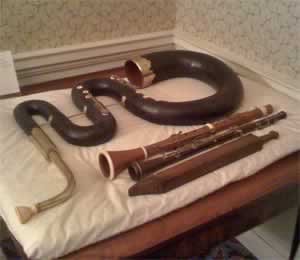Herschel Museum |
|
 |
|||
A museum dedicated to the discoverer of Uranus |
||
Listen to this article |
||
Friedrich Wilhelm Herschel was born in 1738, in Germany. However, at only 19 years of age, he left his home country to begin a new life in England. He picked up the language quickly, and adopted the English version of his name: Frederick William. |
||
Herschel had been musically trained from a young age, and he was already extremely adept at just about any instrument you could name. This skill earned him a series of jobs in orchestras and bands. In 1766 he was appointed as the organist of the Octagon Chapel, in Bath. He moved into a house on New King Street, which was to be his home for the next 15 years. It was in this small building that Herschel made his greatest achievement. Unexpectedly, this had absolutely nothing to do with music. |
||
 Herschel's Horn Photo Alun Salt |
||
In the 1770s, he began to develop an interest in astronomy. For this reason he started making his own telescopes - an activity which sucked away more and more of his time. He was merely an amateur but, on one particular night in 1781, he did something that no professional in the world had ever managed. Using one of his home-made telescopes, he discovered the planet Uranus. |
||
At the time, Saturn was thought to be the most distant of our planets. It's around 890 million miles away from the sun. However, this new celestial body was twice as far away. In one night, Herschel had managed to double the known size of our entire solar system! |
||
The world's astronomers gave him the honour of naming the new planet. He called it Georgium Sidus, after George III, the current King of England. Unfortunately this proved a less than popular choice with the global community. As soon as Herschel died, the name was promptly switched to its current guise. |
||
Nevertheless, the discovery of a new planet shot William to instant fame, and established him as a leader in his field. George III must have appreciated having his name affixed to a lump of rock, as he promptly named Herschel as the official "King's Astronomer". He was given a wage of £200 and told to relocate to Windsor, mainly because the Royal Family all wanted to have a look through his telescopes! |
||
In the following years the new King's Astronomer made plenty more advances. He increased the dimensions of the Milky Way, and learned more about the rotation of Saturn’s rings. It should be noted, however, that Herschel's advances in telescope making were just as significant and impressive as his astronomical discoveries. He gradually improved his craft over the years, before finally reaching a milestone in 1789. By that time he had moved to larger premises in Slough, and it was here that he completed his most ambitious work. This telescope was 40 feet long, making it the world's largest. On its very first night of use, Herschel used it to discover two new moons of Saturn! |
||
In 1981, the small house on New King Street where everything began was transformed into a museum. It celebrates all the achievements that were made within its walls. The exhibits use modern technology to tell their stories. A touch screen display shows how the telescopes and lenses were made inside William's workshop. There's a short film about his discoveries, narrated by the famous astronomer Sir Patrick Moore. You can also see the tiny garden where that brand new planet was first spotted. |
||
Patrick Moore is actually a patron of the museum. He describes Frederick William Herschel as "possibly the greatest observer who ever lived". |
||
|
||
The Herschel Museum is open Monday, Tuesday, Thursday and Friday, 1pm to 5pm. Entry costs around £5 for adults, £2.50 child. Tel: 01225 446865 |
||
|
Pocket Britain is optimised for use on a smartphone or tablet with internet access. All content is subject to copyright. All reasonable methods have been used to ensure information supplied is accurate at the time of publication. However, it is advisable to check information before relying on it. Privacy Policy |